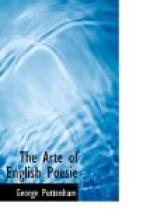should get the best game, and be counted cunningest.
All this I do agree vnto, for no doubt the shepheards
life was the first example of honest felowship, their
trade the first art of lawfull acquisition or purchase,
for at those daies robbery was a manner of purchase.
So saith
Aristotle in his bookes of the Politiques,
and that pasturage was before tillage, or fishing or
fowling, or any other predatory art or cheuisance.
And all this may be true, for before there was a shepheard
keeper of his owne, or of some other bodies flocke,
there was none owner in the world, quick cattel being
the first property of any forreine possession.
I say forreine, because alway men claimed property
in their apparell and armour, and other like things
made by their owne trauel and industry, nor thereby
was there yet any good towne or city or Kings palace,
where pageants and pompes might be shewed by Comedies
or Tragedies. But for all this, I do deny that
the
Eglogue should be the first and most auncient
forme of artificiall Poesie, being perswaded that
the Poet deuised the
Eglogue long after the
other
drammatick poems, not of purpose to counterfait
or represent the rusticall manner of loues and communication:
but vnder the vaile of homely persons, and in rude
speeches to insinuate and glaunce at greater matters,
and such as perchance had not bene safe to haue beene
disclosed in any other sort, which may be perceiued
by the Eglogues of
Virgill, in which are treated
by figure matters of greater importance then the loues
of
Titirus and
Corydon. These Eglogues
came after to containe and enforme morall discipline,
for the amendment of mans behauiour, as be those of
Mantuan and other moderne Poets.
CHAP. XIX.
Of historicall Poesie, by which the famous acts
of Princes and the vertuous and worthy liues of our
forefathers were reported.
There is nothing in man of all the potential parts
of his mind (reason and will except) more noble or
more necessary to the actiue life then memory:
because it maketh most to a sound iudgement and perfect
worldly wisedome, examining and comparing the times
past with the present, and by them both considering
the time to come, concludeth with a stedfast resolution,
what is the best course to be taken in all his actions
and aduices in this world: it came vpon this
reason, experience to be so highly commended in all
consultations of importance, and preferred before any
learning or science, and yet experience is no more
than a masse of memories assembled, that is, such
trials as man hath made in time before. Right
so no kinde of argument in all the Oratorie craft,
doth better perswade and more vniuersally satisfie
then example, which is but the representation of old
memories, and like successes happened in times past.
For these regards the Poesie historicall is of all
other next the diuine most honorable and worthy, as
well for the common benefit as for the speciall comfort




